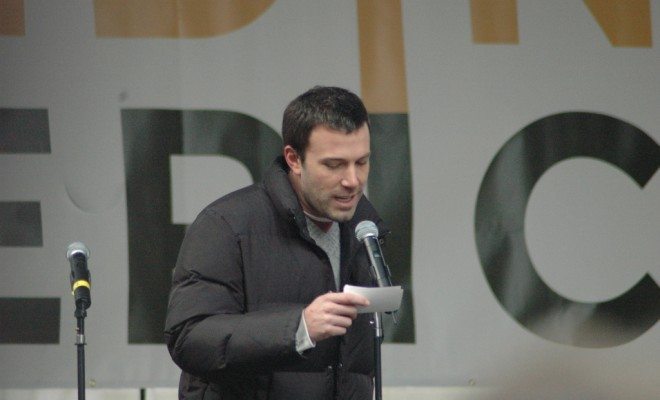
Blogs
4 Reasons Why Celebrities Testifying as Experts is Okay
Pretty much every big name in Hollywood has a preferred charity or two. You hear Elton John, and you think AIDS research. Similarly, Bono is well known for his charitable work in Africa. Before his death, Paul Newman’s charity created camps for children suffering from serious illnesses all over the United States. The work that celebrities do for charities is admirable, and I have no intention of discounting their efforts in any way. But there’s a fine line between being an invaluable part of a charitable movement, and being an expert in that field. And this week, some people are arguing that Congress has blurred that line.
Ben Affleck and Seth Rogen will testify in front of Congress about each of their pet charities. Affleck will speak to the Senate Foreign Relations Committee on the Democratic Republic of the Congo , and Rogen will go in front of a Senate Appropriations Subcommittee to talk about the economic impact of Alzheimer’s research. But does active involvement in related charities qualify them to testify about those causes?

These two scheduled appearances on Capitol Hill have spurred a series of debates over the validity of their Congressional testimonies. Regarding Affleck’s testimony, an anonymous GOP Senate Aide stated, “people serious about resolving problems – especially problems related to life and death – want to have serious conversations with experts and leaders in the field; not celebrities.” Another Republican aide said, “the meeting would be inappropriate given the wide offering of other experts available to speak on the issue.” Seth Rogen sparked slightly less ire, but critics did take to Twitter to mock his supposed expertise on Alzheimer’s.
Now at first glance, I agreed with these critics. But the more I think about it, the more I’m OK with celebrities testifying before Congress — if they’re qualified. So here are the top four reasons that we should be glad Affleck and Rogen are testifying this week.
4. They won’t be alone.
Both Affleck and Rogen will be involved in panel-style discussions, with the former appearing alongside Russell Feingold, the U.S. Special Representative for the Great Lakes Region of Africa; Roger Meece, former U.S. Ambassador to the Democratic Republic of the Congo; and Dr. Raymond Gilpin, Academic Dean of the Africa Center for Strategic Studies. Rogen will join Dr. Francis Collins, Director of the National Institutes of Health, and Dr. Michael Hurd, Director of the RAND Center for the Study of Aging, among others.
Neither of these celebrities is testifying in front of the panels as standalone experts who can give a full view of the problems surrounding the DRC or Alzheimer’s. Rather, they are focusing on their experiences in charity work, and their experiences with people directly affected by war and Alzheimer’s — both angles are important to consider. Affleck founded the Eastern Congo Initiative a few years ago to advocate for the people of that region and to provide much needed grants. Similarly, Rogen and his wife Lauren Miller founded Hilarity for Charity, a foundation to raise funds for and awareness of Alzheimer’s research. Now in my book, that makes them qualified to testify about their experiences with those foundations and the people they impact. Both of the panels will involve discussions of aid and money, and Affleck and Rogen can, at the very least, provide valuable insight into those topics.
3. They have unique access.
Celebrities have unique access in a way that politicians and diplomats sometimes do not. Affleck has been to the DRC many times, and has interacted with a wide variety of players involved. In 2008 his travels were filmed by ABC in an effort to bring attention to the region. He met with refugees, child soldiers, members of parliament, and warlords.
Both of these men occupy places of financial privilege. They are able to travel the globe and talk to way more people than say, a professor with expert knowledge on the subject, or most diplomats. For them to be able to use that privilege to help people is pretty great.

2. It brings media attention to the issue.
Having celebrity spokespeople come and testify about something does cause a media buzz. I guarantee you that if these panels didn’t include Affleck and Rogen, they’d be getting almost no attention. Congress hears from experts all the time, but celebrities are rarer, and they bring heightened attention to the issues. Obviously this is a phenomenon that should be used sparingly, but I think in the case of the Congo and Alzheimer’s, more media attention is deserved. The U.S. government spends around $500 million a year on Alzheimer’s research, which sounds like a lot, but is actually very little when you realize that 5.5 million Americans are estimated to have the degenerative illness. And the Congo, a region that has been war torn for years, does receive foreign aid, but not nearly enough to fix all the systemic issues there. I’m not necessarily suggesting that these issues should receive more federal funding, but attention to them from the private sector and the media can’t possibly hurt.

1. It makes them good role models.
Americans, especially young people, look up to their favorite celebrities. Affleck and Rogen are well known faces, each with their own devoted fan bases. So, I can’t help but think that it’s a good thing for them to be so heavily involved in their charities that they are asked to testify before Congress. It shows that it’s sexy and cool to help others, educate yourself on contentious issues, and find causes about which you’re passionate. Despite some criticism, Affleck will be the new Batman.

Everyone loves Batman, and Affleck has the potential to affect the kids who grow up admiring their favorite superhero. He has the potential to be a great role model for those kids.
Same with Rogen, who I assume will continue his comedy career over the coming years. He’ll be another great role model for involvement and giving back. At the end of the day, say what you want about their qualifications to testify in front of Congress. In my book, their involvement in these great causes, and the fact that they are able to advocate for them in the public sphere makes them much better role models than most celebrities.
—
Anneliese Mahoney (@AMahoney8672) is Lead Editor at Law Street and a Connecticut transplant to Washington D.C. She has a Bachelor’s degree in International Affairs from the George Washington University, and a passion for law, politics, and social issues. Contact Anneliese at amahoney@LawStreetMedia.com.
Featured image courtesy of [WEBN-TV via Flickr]









Comments